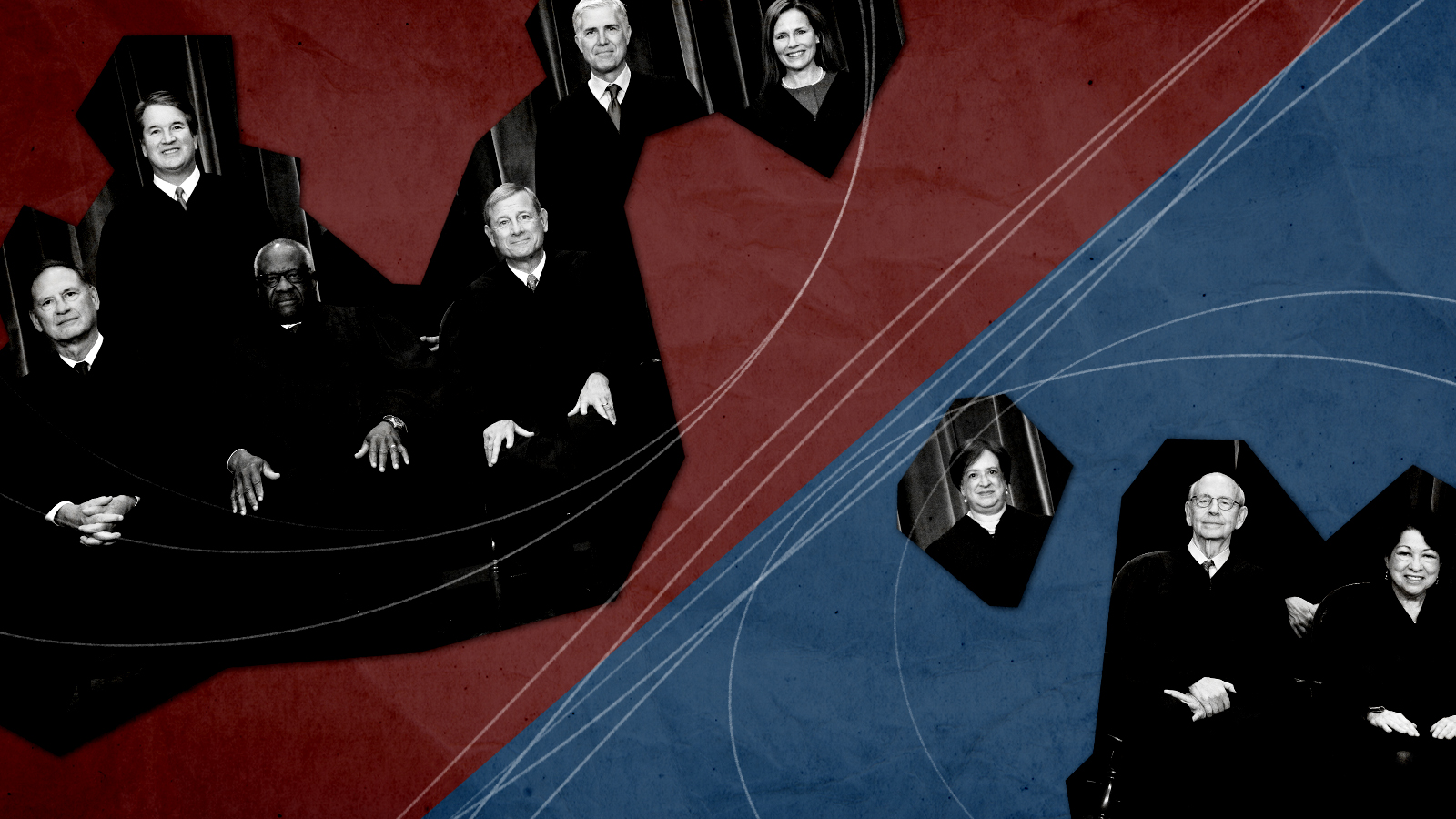The 1 issue that hardens the Supreme Court's ideological split


A free daily email with the biggest news stories of the day – and the best features from TheWeek.com
You are now subscribed
Your newsletter sign-up was successful
The Supreme Court isn't so ideologically scrambled, after all.
Justices handed down two decisions Thursday morning, on the final day of the court's term — one upholding a pair of Arizona election laws that challengers said discriminated against minorities, and another striking down a California policy requiring charities and nonprofits to disclose their major donors. In both cases, the split was identical: The court's six Republican-appointed justices were in the majority, and its three Democratic-appointed justices dissented.
Such partisan divisions were expected when then-President Donald Trump last year appointed Amy Coney Barrett to the high court and cemented a conservative majority. During her first term, though, the court has produced some unexpected results. It handed down more unanimous decisions than it had in years, and came up with a surprising 7-2 decision that preserved Obamacare. A few observers suggested there might actually be a 3-3-3 ideological split among justices, and some conservatives made the case that liberal fears of a Republican supermajority on the court had been overblown — the three Trump-appointed justices, National Review's Jim Geraghty wrote Tuesday, "could help create a less intensely divided Court."
The Week
Escape your echo chamber. Get the facts behind the news, plus analysis from multiple perspectives.

Sign up for The Week's Free Newsletters
From our morning news briefing to a weekly Good News Newsletter, get the best of The Week delivered directly to your inbox.
From our morning news briefing to a weekly Good News Newsletter, get the best of The Week delivered directly to your inbox.
Perhaps not. The split in Thursday's rulings was stark and predictable. What made them different from the other cases this term? The topic at hand was electoral power. The Arizona laws were openly designed to give the GOP an edge in that state's elections, while the California disclosure policy was challenged by conservative advocacy groups interested in keeping their financial backers in the shadows.
It makes sense that the court's ideological borders would reassert themselves in these cases. Probably the No. 1 issue dividing Republicans and Democrats these days is democracy itself — Democrats want more, and the GOP wants less, and in both cases take those positions out of electoral self-interest. "An abiding principle that unites the entire GOP from McConnell to Trump to Roberts: making things harder for voters and easier for donors," MSNBC's Chris Hayes observed after the court's verdicts were announced. On issues from health care to religious liberty and beyond, there is room for justices across the political spectrum to freelance. When it came to the future of America's elections, though, everybody fell in line.
A free daily email with the biggest news stories of the day – and the best features from TheWeek.com
Joel Mathis is a writer with 30 years of newspaper and online journalism experience. His work also regularly appears in National Geographic and The Kansas City Star. His awards include best online commentary at the Online News Association and (twice) at the City and Regional Magazine Association.
-
 The ‘ravenous’ demand for Cornish minerals
The ‘ravenous’ demand for Cornish mineralsUnder the Radar Growing need for critical minerals to power tech has intensified ‘appetite’ for lithium, which could be a ‘huge boon’ for local economy
-
 Why are election experts taking Trump’s midterm threats seriously?
Why are election experts taking Trump’s midterm threats seriously?IN THE SPOTLIGHT As the president muses about polling place deployments and a centralized electoral system aimed at one-party control, lawmakers are taking this administration at its word
-
 ‘Restaurateurs have become millionaires’
‘Restaurateurs have become millionaires’Instant Opinion Opinion, comment and editorials of the day
-
 Big-time money squabbles: the conflict over California’s proposed billionaire tax
Big-time money squabbles: the conflict over California’s proposed billionaire taxTalking Points Californians worth more than $1.1 billion would pay a one-time 5% tax
-
 Supreme Court upholds California gerrymander
Supreme Court upholds California gerrymanderSpeed Read The emergency docket order had no dissents from the court
-
 Did Alex Pretti’s killing open a GOP rift on guns?
Did Alex Pretti’s killing open a GOP rift on guns?Talking Points Second Amendment groups push back on the White House narrative
-
 Washington grapples with ICE’s growing footprint — and future
Washington grapples with ICE’s growing footprint — and futureTALKING POINTS The deadly provocations of federal officers in Minnesota have put ICE back in the national spotlight
-
 Trump’s Greenland ambitions push NATO to the edge
Trump’s Greenland ambitions push NATO to the edgeTalking Points The military alliance is facing its worst-ever crisis
-
 Why is Trump threatening defense firms?
Why is Trump threatening defense firms?Talking Points CEO pay and stock buybacks will be restricted
-
 The billionaires’ wealth tax: a catastrophe for California?
The billionaires’ wealth tax: a catastrophe for California?Talking Point Peter Thiel and Larry Page preparing to change state residency
-
 How robust is the rule of law in the US?
How robust is the rule of law in the US?TODAY’S BIG QUESTION John Roberts says the Constitution is ‘unshaken,’ but tensions loom at the Supreme Court
